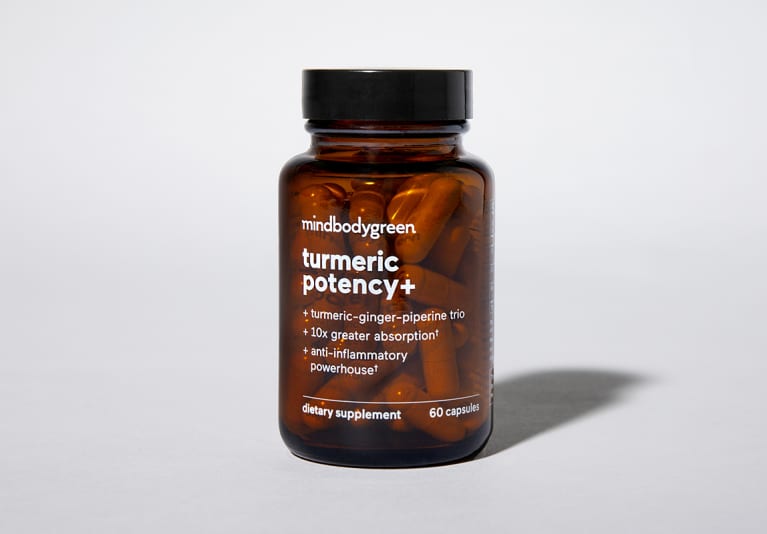
If you’ve enjoyed a golden milk latte or Thai yellow curry, then you’re no stranger to the delicious (and colorful!) nature of turmeric. Known for its characteristic golden-orange hue, turmeric is an ancient spice that comes from the Curcuma longa plant, which belongs to the ginger family (Zingiberaceae).
While this delightfully grounding spice is a wonderful addition to any home-cooked dish or beverage, turmeric’s flavor profile and sunny disposition isn’t all it has going for it. This ancient herb boasts a number of impressive health benefits and has been used in Ayurveda to both add flavor to South Asian dishes and promote anti-inflammatory and antioxidant properties in the body for thousands of years.* (Yes, we said thousands).
With all this anti-inflammatory action, turmeric is especially beneficial for musculoskeletal health–particularly providing our joints with the support they need to move with comfort and ease.* In fact, if we played a word association game, and I asked for “an herb or spice that helps your joints,” many people would say “turmeric” or “curcumin” (the famous curcuminoid in turmeric). That’s just how enduring and well-known this relationship is.
How turmeric supports joint health.
Our joints are vital to daily movement and quality of life across the lifespan. Keeping them strong and mobile is critical for overall musculoskeletal support. (If you’ve ever practiced a sport that puts extra strain on your joints before like running or skiing, you understand firsthand how important joint comfort truly is.)
Whether you’re hiking a steep mountain trail or simply running up the stairs to grab something from your bedroom, fluid joint mobility is key to a thriving and enduring musculoskeletal system. Turmeric promotes joint health by helping regulate (and dampen) pro-inflammatory pathways to ensure your joints can move with comfort and ease for the long haul.*
turmeric potency+
Anti-inflammatory powerhouse clinically shown to improve joint health*

How does turmeric do this, exactly? Answer: Curcuminoids, especially the widely researched one, curcumin.
Curcumin is a bioactive phytonutrient compound found in turmeric that’s responsible for both its vibrant color and its anti-inflammatory actions.* While the curcumin polyphenol is certainly the most studied of turmeric’s curcuminoids, nutritional physician specialist, author of Spice Up, Live Long, and host of the Practically Healthy by Dr. Melina podcast, Melina Jampolis, M.D., shares that the exact mechanisms of curcumin’s anti-inflammatory properties are complex, multidimensional, and still being uncovered via exciting research.
Evidence indicates that curcumin works in numerous ways to modulate anti-inflammatory activities both directly and indirectly.*
Curcumin helps inhibit cellular pro-inflammatory pathways.
We won’t dive too deeply into the science here, but the body has a number of pro-inflammatory mediators—i.e., cytokines, enzymes, and other messenger molecules—that modulate pro- vs. anti-inflammatory responses. Curcumin interacts with these key mediators to help regulate the body’s pro-inflammatory response.*
For example, curcumin has been found to directly bind to pro-inflammatory cytokines, such as TNF alpha, IL-1 beta, and IL-6, and inhibit their expression.* Additionally, “curcumin reduces the activity of enzymes involved in inflammatory pathways—including COX-2, lipoxygenase, and inducible iNOS,”* Jampolis explains.
Curcumin modulates pro-inflammatory gene expression.
Curcumin also promotes anti-inflammatory activity by interacting with our genes.*
“Curcumin blocks the activation of compounds called transcription factors that normally turn on genes and pathways associated with the production of pro-inflammatory substances,”* essentially “turning off” these genes, Jampolis shares. Additionally, curcumin “‘turns on’ genes and pathways associated with the production of anti-inflammatory proteins,”* she explains.
This is yet another fantastic example of how our diet and supplementation choices impact our overall health, even at the level of DNA. (Go epigenetics!)
Curcumin combats oxidative stress.
Remember when we mentioned that curcumin also has antioxidant properties? It turns out its ability to help fight oxidative stress plays a part in its anti-inflammatory actions as well.*
“Curcumin is also a powerful antioxidant, so it can neutralize free radicals produced during normal metabolism, or from the environment,”* Jampolis explains. This helps protect cells and limits the pro-inflammatory response.*
What to look for in a turmeric supplement for joint support.
According to clinical dietitian Huma Chaudhry, R.D., LDN, one teaspoon of turmeric provides approximately 200 milligrams of curcumin. And while dietary consumption of turmeric (think: curry dishes) can certainly be helpful and healthful, a turmeric root extract with proven bioavailability and joint-relevant benefits is the most targeted way to deliver curcuminoids to your body daily.*
mbg’s daily turmeric supplement, turmeric potency+, delivers 500 milligrams of full-spectrum turmeric root extract (i.e, featuring the full array of curcuminoids, including curcumin) as Acumin™, a unique form of the powerhouse herb clinically shown have superior bioavailability, reduce key inflammatory biomarkers (e.g., CRP and ESR), and improve joint health parameters.*
Additionally, our innovative ancient spice trio features full-spectrum ginger root (for additional antioxidant and anti-inflammatory joint health support) and piperine from black pepper fruit extract (for incremental bioavailability benefits).*
Whether you’re adding turmeric to your weekly meals or have yet to incorporate it into your daily routine, a high-potency turmeric supplement with enhanced bioavailability and a higher percentage of curcumin, like mbg’s turmeric potency+, is a great option for promoting your overall musculoskeletal health, including those precious joints.*
If you are pregnant, breastfeeding, or taking medications, consult with your doctor before starting a supplement routine. It is always optimal to consult with a health care provider when considering what supplements are right for you.

turmeric potency+
Anti-inflammatory powerhouse clinically shown to improve joint health*
turmeric potency+
Anti-inflammatory powerhouse clinically shown to improve joint health*

https://www.mindbodygreen.com/articles/turmeric-anti-inflammatory-actions-promote-joint-health

